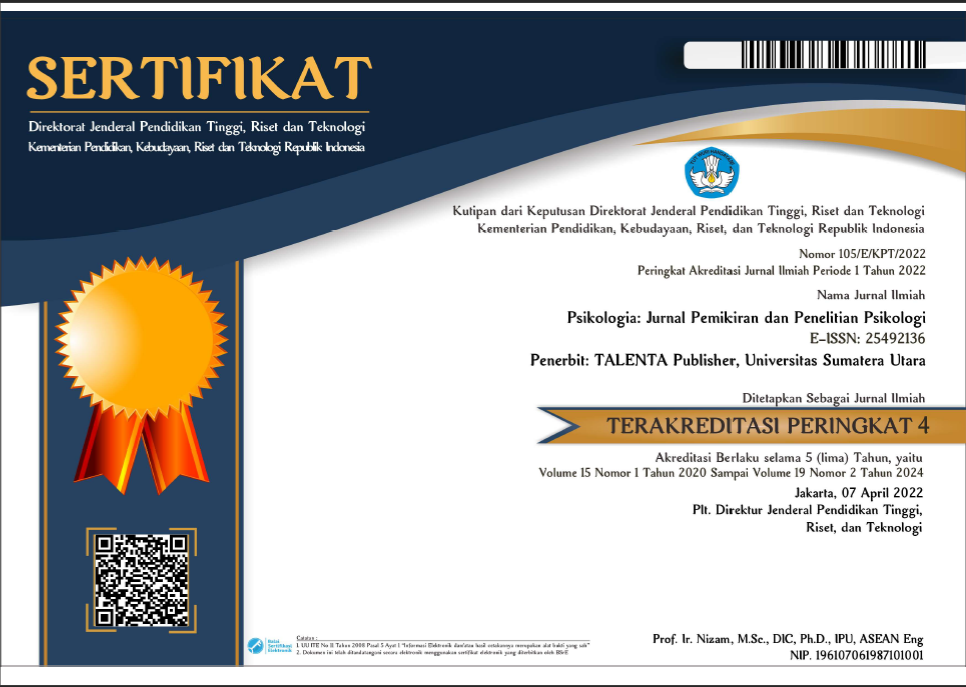The correlation between experienced workplace incivility with the psychological well-being of employees
Hubungan antara experienced workplace incivility dengan kesejahteraan psikologis pada karyawan
DOI:
https://doi.org/10.32734/psikologia.v18i1.10493Keywords:
experienced workplace incivility, psychological well-being, employeeAbstract
This study aims to determine the relationship between experienced workplace incivility and the psychological well-being of employees. The research hypothesis is that there is a negative relationship between experienced workplace incivility and psychological well-being. The subjects in this study were 40 employees who filled out the experienced workplace incivility scale and the psychological well-being scale. The data analysis method used is the Pearson product-moment correlation. Based on data analysis, in testing the hypothesis of the relationship between experienced workplace incivility, a correlation coefficient of rxy -.368 (p<.005) is obtained, which means a negative relationship exists between experienced workplace incivility in employees. The coefficient of determination (R2) is .136 or 13.6%, and other factors influence the remaining 86.4%.
Downloads
References
Akhtar, S., Luqman, R., Raza, F., Riaz, H., Tufail, H. S., & Shahid, J. (2017). The impact of workplace incivility on the psychological wellbeing of employees through emotional exhaustion. European Online Journal of Natural and Social Sciences, 6(3), 492.
Azwar, S. (2017). Metode penelitian psikologi (Edisi kedua). Yogyakarta: Pustaka Pelajar.
Azwar, S. (2018). Reliabilitas dan validitas (Edisi keempat). Yogyakarta: Pustaka Pelajar.
Cortina, L. (2008). Unseen injustice : incivility as modern discrimination in organizations published by : Academy of Management unseen injustice : incivility as modern discrimination in organizations. Academy of Management Review, 33(1), 55–75.
Cortina, L. M., Kabat-Farr, D., Leskinen, E. A., Huerta, M., & Magley, V. J. (2013). Selective incivility as modern discrimination in organizations: evidence and impact. Journal of Management, 39(6), 1579–1605. doi:10.1177/0149206311418835
Cortina, L. M., Magley, V. J., Williams, J. H., & Langhout, R. D. (2001). Incivility in the workplace: incidence and impact. Journal of Occupational Health Psychology, 6(1), 64–80. doi:10.1037/1076-8998.6.1.64
Gifaranti, R. J. (2020). Hubungan antara self determination dengan work engagement pada guru Sekolah Luar Biasa Negeri 1 Bantul. http://eprints.mercubuana-yogya.ac.id/8983/
Hadi, S. (2015). Metodologi riset. Yogyakarta : Pustaka pelajar.
Hendryadi, H., & Zannati, R. (2018). Hubungan workplace incivility dan turnover intention: efek moderasi gender. Inovasi, 14(2), 123. doi:10.29264/jinv.v14i2.4088
Panigoro, S., Worang, F., & Uhing, J. (2016). Kantor pelayanan kekayaan negara dan lelang performance of employees in service office of state property. Jurnal EMBA: Jurnal Riset Ekonomi, Manajemen, Bisnis Dan Akuntansi, 16(2), 517–528. ejournal.unsrat.ac.id/index.php/jbie/article/view/12758
Parmin, P. (2014). Pengaruh kualitas kehidupan kerja, disiplin kerja dan kompetensi terhadap kinerja pegawai pada PD. BPR BKK Kebumen. Fokus Bisnis : Media Pengkajian Manajemen Dan Akuntansi, 13(2), 81–106. doi:10.32639/fokusbisnis.v13i2.24
Pearson, C. M., Andersson, L. M., & Wegner, J. W. (2001). When workers flout convention: A study of workplace incivility. Human Relations, 54(11), 1387–1419. doi:10.1177/00187267015411001
Porath, C. L., & Pearson, C. M. (2012). Emotional and behavioral responses to workplace incivility and the impact of hierarchical status. Journal of Applied Social Psychology, 42(SUPPL. 1).doi:10.1111/j.1559-1816.2012.01020.x
Ryff, C. D. (2013). Psychological well-being revisited: Advances in the science and practice of eudaimonia. Psychotherapy and Psychosomatics, 83(1), 10–28. doi:10.1159/000353263
Yuniasanti, R., & Abas, N. A. H. (2019). Translation and adaptation culture: Experience workplace incivility scale in Indonesia. Asian Journal of Assessment in Teaching and Learning, 9(1), 1–15. doi:10.37134/ajatel.vol9.no1.1.2019
Downloads
Published
How to Cite
Issue
Section
License
Copyright (c) 2023 Psikologia: Jurnal Pemikiran dan Penelitian Psikologi

This work is licensed under a Creative Commons Attribution-ShareAlike 4.0 International License.








